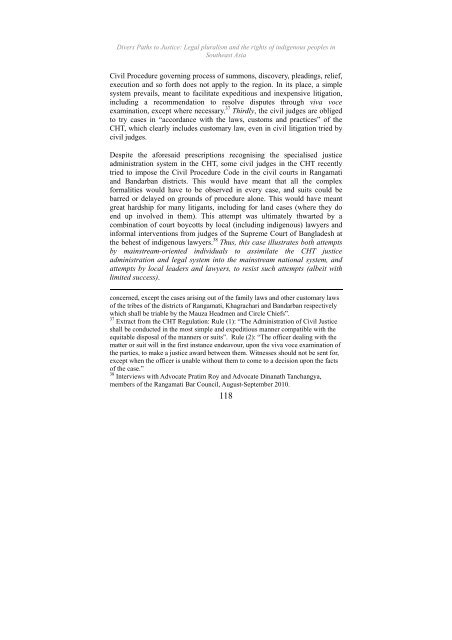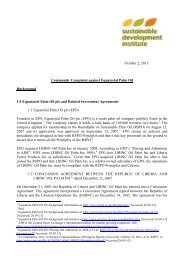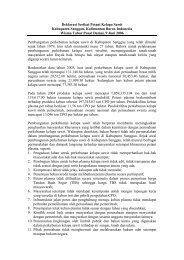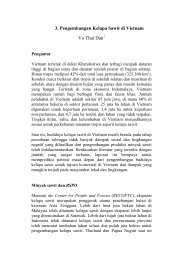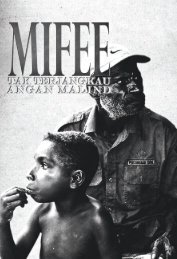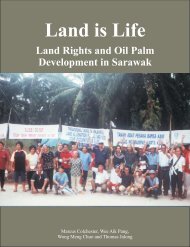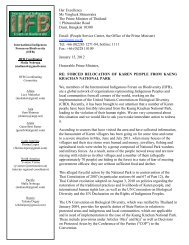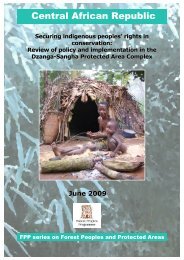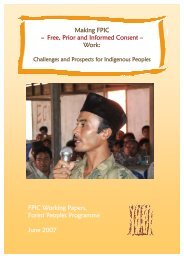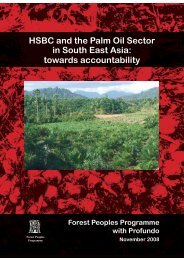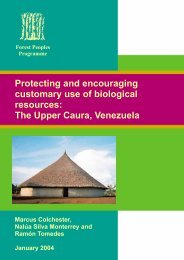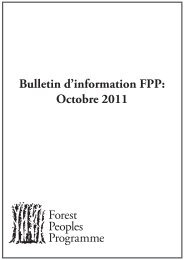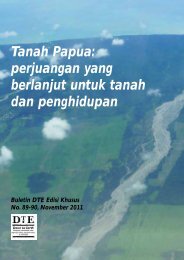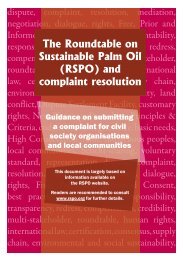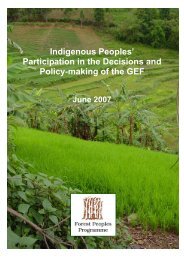Divers Paths to Justice - English - Forest Peoples Programme
Divers Paths to Justice - English - Forest Peoples Programme
Divers Paths to Justice - English - Forest Peoples Programme
Create successful ePaper yourself
Turn your PDF publications into a flip-book with our unique Google optimized e-Paper software.
<strong>Divers</strong> <strong>Paths</strong> <strong>to</strong> <strong>Justice</strong>: Legal pluralism and the rights of indigenous peoples inSoutheast AsiaCivil Procedure governing process of summons, discovery, pleadings, relief,execution and so forth does not apply <strong>to</strong> the region. In its place, a simplesystem prevails, meant <strong>to</strong> facilitate expeditious and inexpensive litigation,including a recommendation <strong>to</strong> resolve disputes through viva voceexamination, except where necessary. 37 Thirdly, the civil judges are obliged<strong>to</strong> try cases in “accordance with the laws, cus<strong>to</strong>ms and practices” of theCHT, which clearly includes cus<strong>to</strong>mary law, even in civil litigation tried bycivil judges.Despite the aforesaid prescriptions recognising the specialised justiceadministration system in the CHT, some civil judges in the CHT recentlytried <strong>to</strong> impose the Civil Procedure Code in the civil courts in Rangamatiand Bandarban districts. This would have meant that all the complexformalities would have <strong>to</strong> be observed in every case, and suits could bebarred or delayed on grounds of procedure alone. This would have meantgreat hardship for many litigants, including for land cases (where they doend up involved in them). This attempt was ultimately thwarted by acombination of court boycotts by local (including indigenous) lawyers andinformal interventions from judges of the Supreme Court of Bangladesh atthe behest of indigenous lawyers. 38 Thus, this case illustrates both attemptsby mainstream-oriented individuals <strong>to</strong> assimilate the CHT justiceadministration and legal system in<strong>to</strong> the mainstream national system, andattempts by local leaders and lawyers, <strong>to</strong> resist such attempts (albeit withlimited success).concerned, except the cases arising out of the family laws and other cus<strong>to</strong>mary lawsof the tribes of the districts of Rangamati, Khagrachari and Bandarban respectivelywhich shall be triable by the Mauza Headmen and Circle Chiefs”.37 Extract from the CHT Regulation: Rule (1): “The Administration of Civil <strong>Justice</strong>shall be conducted in the most simple and expeditious manner compatible with theequitable disposal of the manners or suits”. Rule (2): “The officer dealing with thematter or suit will in the first instance endeavour, upon the viva voce examination ofthe parties, <strong>to</strong> make a justice award between them. Witnesses should not be sent for,except when the officer is unable without them <strong>to</strong> come <strong>to</strong> a decision upon the factsof the case.”38 Interviews with Advocate Pratim Roy and Advocate Dinanath Tanchangya,members of the Rangamati Bar Council, August-September 2010.118


